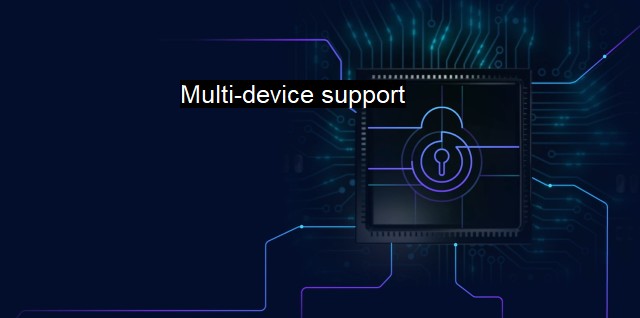What is Multi-device support?
The Significance of Multi-Device Support in Cybersecurity: Protecting Your Data and Devices Against Evolving Threats
Multi-device support refers to the ability of software or an application, specifically within the sphere of cybersecurity and antivirus protection, to function effectively across various types of devices. Cyber attacks can occur on an array of digital platforms, including desktops, laptops, smartphones, and tablets. Therefore, it is essential for modern cybersecurity programs to protect all devices since each represents a potential vulnerability if left unprotected.When we speak of multi-device support, we refer to an antivirus solution that seamlessly works across all different operating systems, be it Windows, iOS, Android, or macOS. It ensures the coherent protection of all devices connected to a network from various possible security threats. Since digital devices are increasingly interconnected, having multi-device support reduces the risk of a cyber attack filtering through one device to compromise the entire network.
Nowadays, most people do not confine their digital lives to a single device. Many make use of wireless technologies, cloud solutions, and other strategies to ensure accessibility of their data across multiple gadgets. With each device, it represents another potential entrance for cyber attackers. Herein lays the significance of multi-device support. This cybersecurity feature provides real-time protection against potential cyber attacks which can compromise personal or business information.
Technically, cybersecurity tools with multi-device support frequently screen and analyze files for potential threats. They then isolate or eliminate the threats before they bring harm. Types of threats include ransomware, spyware, Trojans, phishing, malware, or even direct hacking attempts. encrypted transactions and regular updating of security software are components of multi-device support, ensuring safe web browsing and up-to-date protections against new threats.
A key feature of multi-device support is its centralized feature, which provides a unified security solution through a singular platform. Users can manage the security of multiple devices through one central dashboard which shows scan reports, notifications of potential threats and allows control of various security settings. Hence, it simplifies the overall management of device security and allows swift action when threats are detected.
Multi-device support also plays a crucial role in protecting Internet of Things (IoT) devices. As the IoT proliferates, more non-traditional devices are being connected to networks. These include household appliances (like smart fridges, TVs, or thermostats), medical devices, and even vehicles. Many of these devices lack robust inherent security features, making them vulnerable targets for cyber attackers. Thus, a cybersecurity solution with multi-device support takes on the more vital role of safeguarding these secondary devices alongside one's primary devices like the computer or smartphone.
While the primary function of multi-device support is to provide active protection to devices against cyber threats, it also functions to boost privacy control. It can protect users from being tracked online by masking IP addresses and enabling safer connections when using public Wi-Fi through the provision of a Virtual Private Network (VPN).
Multi-device support is essential in today's interconnected world where the usage of multiple digital devices is commonplace. Whether for personal or business usage, integrating multi-device support into one's cybersecurity practices ensures optimal protection against varying types of cyber threats. As mobile devices become more innovated and new technologies, such as IoT devices, continue to emerge, multi-device support remains key in maintaining a robust, multi-layered defense against ever-evolving cyberspace threats.

Multi-device support FAQs
What is multi-device support in cybersecurity and antivirus?
Multi-device support refers to the ability of a security software to protect multiple devices, such as smartphones, tablets, and computers, with a single license or subscription.Why is multi-device support important in cybersecurity and antivirus?
Multi-device support is important because people nowadays own and use multiple devices, and each device is vulnerable to different cyber threats. With multi-device support, users can protect all their devices from various online threats with ease and convenience.Which cybersecurity and antivirus solutions offer multi-device support?
Many cybersecurity and antivirus solutions offer multi-device support, such as Norton Security, McAfee Total Protection, Bitdefender Total Security, Kaspersky Total Security, and Avast Premium Security, to name a few.Is there an additional cost for multi-device support in cybersecurity and antivirus?
It depends on the cybersecurity and antivirus solution. Some products offer multi-device support for free, while others require an additional fee for each device. It's important to check the pricing and licensing options before choosing a cybersecurity and antivirus solution with multi-device support.| | A | | | B | | | C | | | D | | | E | | | F | | | G | | | H | | | I | | | J | | | K | | | L | | | M | |
| | N | | | O | | | P | | | Q | | | R | | | S | | | T | | | U | | | V | | | W | | | X | | | Y | | | Z | |
| | 1 | | | 2 | | | 3 | | | 4 | | | 7 | | | 8 | | |||||||